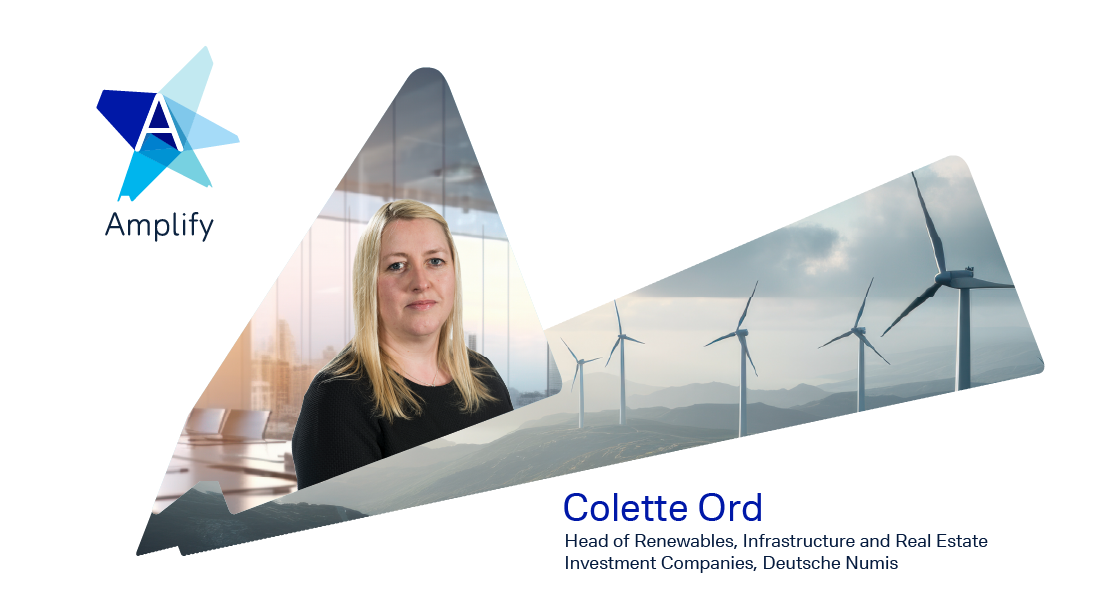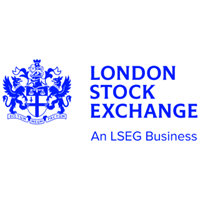-
BackWhat we doNumis is an ambitious, dynamic and innovative investment bank, driven to excel across all aspects of its delivery.Investment Banking
-
BackLatest newsRead the latest news about our business, our people and our work, find out about our next events and conferences.News
-
BackWho we areOur collaborative environment and distinctive way of excelling , is nothing without our great people.
-
BackOur board
Amplify | Colette Ord
Our new Amplify series shares some of the unique perspectives of colleagues from around Deutsche Numis and celebrates the impact they are having on clients, our teams or the wider community

For the first in our new series, we were delighted to talk to Colette Ord, Head of Renewables, Infrastructure and Real Estate, Investment Companies, at Deutsche Numis about her important work in sustainability and how she has built a long career with the business. despite some challenges along the way.
How did you get into this area?
From a small child, I told everyone who would listen that I wanted to be an ‘international businesswoman’, as my father travelled for his work and it all seemed terribly exciting.
I initially wanted to work in corporate finance, as it is law-based. I read European studies with law and French in my hometown of Liverpool, then started with Numis (as was) on the graduate scheme in 2001. I initially worked as an analyst within the equity research team, with very brief stints covering retail and leisure, before finding a natural interest in real assets covering building and construction companies and latterly REITs. I liked the research component of the job - the skillset you acquire when training in law is quite similar.
When a role opened up within the newly formed investment companies team in 2008, I moved across to focus on real assets, specifically infrastructure and real estate businesses. At that time, investment companies were an unknown product to me, but I was convinced of their relevance to a wide range of investors by the enthusiastic, now retired, founding member of the team. He had anticipated strong demand for alternative assets, so it struck me as a good opportunity to apply my asset class knowledge.
Can you tell us about your role?
My job title is rather lengthy, Head of Renewables, Infrastructure and Real Estate for the investment companies team, but it reiterates my focus! It involves detailed analysis of companies in my area and providing clients with the context that is most relevant to their respective risk/return tolerance from the asset class. An investor seeking equity returns will potentially be looking for different characteristics and financial metrics to a charity, multi-asset or pension fund investor, so our product range is very varied to reflect this.
Investment companies (often known as investment trusts) represent a significant part of the London listed market, comprising 365 different companies, with £268bn of assets under management (AIC data at 31 12 2023). They can be categorised into a range of sub-sectors, including equities, debt, private equity, property and infrastructure. Along with my colleague, Andrew, and support from the wider team, our real assets coverage extends to 30 listed infrastructure trusts and 23 real estate funds, which make up a large proportion of the universe.
Investment companies differ from open-ended funds given their greater liquidity by virtue of their listed status. Real asset funds have many similarities with traditional operating companies, but operations are typically undertaken by a specialist external manager paid on a contractual basis, with the ability to be replaced if required, subject to certain circumstances. Investment companies have independent boards of directors who are there to ensure the external manager is fulfilling the terms of the contract and delivering on the stated investment strategy and target returns of the investment company.
Am I right in thinking your approach to the area differs from others?
I would say from an investment companies perspective my peers would typically take a generalist approach to sector analysis, covering all areas, whereas I have chosen to specialise in very specific segments. I spend all of my day discussing infrastructure and specialist real estate strategies, with a goal to be the first call for clients when they want a balanced view of companies within those areas, drawing on over 20 years of experience.
How does the investment companies team work together?
We describe ourselves as a microcosm of the wider Deutsche Numis business. We have a large team from a variety of backgrounds, which solely focusses on investment companies. We provide a wide range of services to corporates and institutions, including detailed company analysis, trading, sales and specialist corporate advice.
What changes have you seen in the market over your long career?
The topics of diversity and sustainability have certainly moved up the corporate agenda. I would say our team has been an early mover in this regard from a personnel and commercial perspective. We have raised a meaningful proportion of capital (>£8.5bn) in the alternatives space over the last 15 years, a large proportion of which has been in real assets.
This capital has been deployed into assets as varied as doctors’ surgeries and commercial real estate to offshore transmission cables, renewable generation assets in the UK, Europe and beyond, schools, trains and other essential social assets. This includes the launch of the first ever solar fund in the UK - Bluefield Solar Income in 2013, which has become one of the largest owner/operators of commercial solar assets in the UK. We also launched the first UK listed global focussed energy transition fund in 2021, Victory Hill Global Sustainable Energy Opportunities, which seeks to accelerate the journey to a net zero carbon world by addressing structural demand gaps in a wide range of markets.
How do your clients’ activities contribute to sustainability in the UK?
In 1987, the United Nations commission defined sustainability as “meeting the needs of the present without compromising the ability of future generations to meet their own needs”. We see many real asset investment companies as a natural place for investors to access companies that embody this definition. Investors that have supported primary and secondary capital raises have been instrumental in the delivery of many economic, social and environmentally essential assets.
For example, listed renewable generators have funded c.16% of the UK’s renewable generation capacity. Other specialist funds dominate key energy transition markets, such as battery storage, or facilitate the connection of offshore wind farms to the national grid.
As well as new companies that have been set up with sustainability as a core part of the investment strategy, other long-established operators have strategically evolved to ensure sustainability and ESG is at the heart of what they do. Each time investors support these mandates they are contributing to sustainability in the UK and beyond.
Can you tell us more about your clients?
We have a very wide institutional client base, including wealth managers, multi-asset, insurance and pension funds, as well as equity investors, all of which view the real asset investment companies through a different lens. Some use the peer group as a diversifier to other investment types, with generally low volatility of portfolio returns, helped in most cases by a healthy level of income. Active management of portfolios also provide scope for capital returns. Others are looking for exposure to difficult-to-access assets within defined risk/return criteria.
For many years, a large number of the peer group, generally in the infrastructure sector, have traded at a premium to asset value, with long-term return delivery in line or ahead of stated targets. Macro-economic volatility and uncertainty over peak interest rates has resulted in the appearance of widespread discounts and prompted investors to reassess the future outlook for returns. Against this backdrop, investors need more detailed advice than ever to help identify those companies that are best placed in the evolving macro environment . It is crucial to have a solid understanding of both client type and asset class in this role, which allows us to recommend a tailored range of options for each client.
I understand you have won awards for your work?
We have always been extremely highly rated as a team – however, my own personal validation comes not from awards, but from the client feedback, both institutional and corporate. When someone tells you that you are incredibly helpful and values your knowledge, that is a great feeling. Our clients don’t have the luxury of focusing on one sub-sector, as they’re looking at the whole market, so they rely heavily on our team’s specialist asset class knowledge and value our tailored approach. The end result is that we have a long-standing relationship with a broad range of corporate and institutional clients.
How do you share your sector knowledge with the clients?
We have a wide range of products, which institutional and corporate clients can access for our thoughts on the sector. These include detailed portfolio and performance statistics, presentations and commentary on key company and relevant macro newsflow. I recognise that clients access the sector for different reasons and we seek to highlight what is most relevant to them.
How have you managed juggling family priorities with your career?
I have three children, so it hasn’t been without its challenges! Maternity conditions have definitely improved over the years, and I work with a great team, but we could still do more to make it easier for women to have a better family and work/life balance.
Has there been any sense of a glass ceiling in your career?
If I had listened to some early career ‘advice’, I would have given up a very long time ago, but luckily I am far too stubborn! I do believe that resilience and determination go a long way as a woman working in what has traditionally been a very male-dominated industry. Having a passion for what I do has also been absolutely essential in helping me to convince others along the way that doing things differently can yield great results. I hope that, with our new parent company, things can continue to move in a positive direction.




